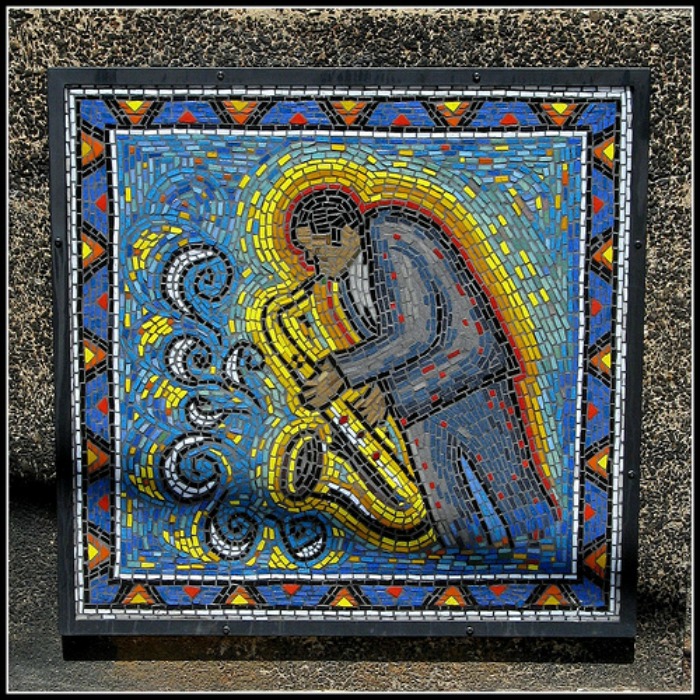Last week, I had a post about Religion and Spirituality as a Source of Strength for African Americans based upon Dr. Jonathan Singer’s podcast Incorporating Religion and Spirituality into Social Work Practice with African Americans in which he interviewed Dr. Nancy Boyd-Franklin.
Today, I thought of continuing that discussion by sharing some of the suggestions Dr. Boyd-Franklin had on bringing up the topic of religion and spirituality with African American individual or family clients.
Saxophone in Glass Tile (Glass tiles were done by Cheryl Levin and Mural Corps Youth)
One way of introducing the subject could be: “You know, just curious, do you have a church family? or “Have you ever had a church family? and “What kinds of things do you count on them for?”
If they say “no,” to being religious, Dr. Boyd-Franklin recommends probing further about their spirituality in the following manner: “I know there are a lot of folks who are not religious but they may be spiritual. Would you describe yourself as spiritual?” And then follow up with “Tell me a little bit about your spirituality,” or “Tell me a little about your church,” if they shared that they are church members.
One caveat to remember is that the church and/or spirituality is not a source of support for all African Americans. However, if it is important for a particular client, it is likely to be an extremely critical source of support. Hence the need to explore the issue of religious or spiritual involvement with African Americans. It is not necessary to know all the little details to do strength-based work.
Benjamin Long Fresco
An important cautionary notes: practitioners are to avoid imposing their own spiritual or religious beliefs on their clients. According to Dr. Boyd-Franklin, cultural competency means being able to ask the client relevant questions and engage in reflective listening.
To illustrate, when a client shares that the church is like a family to them, you might respond by saying: “So you’re saying that this is really like your family. This is really central to your life.” And then you would want to follow up with “Tell me more about it,” so that you would be able to get a sense of how much the church/spirituality is a part of their lives and how much they rely on various church services.
Alternatively, to a nonreligious client who expressed the fact that he is spiritual, you might say “You’re not particularly religious but you’re saying spirituality is sort of who you are, tell me more about that.” And then (if this patient has had previous bouts of depression) you may want to follow up with “How might you use spirituality when you’re feeling depressed or when you’re dealing with issues in your family or in your life?”
This type of exchange opens up the dialogue in a way that can be very powerful. The practitioner has the opportunity to learn what are some key sources of resilience and support for the client. This, in turn, can be incorporated later into some therapeutic interventions by leading the client to either draw upon past resources that have proven themselves as effective buffers or new available supports from neighboring church families.
Mural Tribute to Dr. Herman Wrice
(a community organizer, activist and fighter against drug abuse)
Mural on the side of a house in Philadelphia.
For instance, you could ask a person with a church family whether they have ever had a prayer partner. A prayer partner is someone from the church that could pray with them daily who can be of additional support to a person who is in need of extra support such as a newly released person from the hospital with suicidal ideation.
This type of intervention in combination with therapy is wonderful but you could only ask the client about this if you knew about it. The two resources listed below provide some information about additional possible ideas that could be used for interventions.
After listening to this informative podcast, these questions came to my mind:
- How best to handle questions like what is my religion and how observant am I (when the client comes from an obviously different background)?
- Does the Hispanic population also tend to derive as much strength and resilience as the African American population from their religion and spirituality?
- Does the Hispanic population tend to also have access to church families and church services?
I posed these questions to Dr. Boyd-Franklin. While I’m waiting to hear back, do you happen to have any suggestions and/or information about the Hispanic population?
In a subsequent post, I’m thinking about extending the concept of talking about religion and spirituality with people from all ethnic and racial backgrounds.What are your thoughts and feelings about talking to clients about religion and spirituality? Would you have some reservations in doing so? How have you addressed being different in religion and/or observance level from your clients and/or your clients questions about this?
Two resources for further reading are:
Boyd-Franklin, N. (2003). Black families in therapy: Understanding the African American experience. (pp. 125-43). New York: Guilford Press.
Boyd-Franklin, N. and Lockwood, T.W. (2009) Spirituality and religion: Implications for psychotherapy with African American families. In F. Walsh (Ed.), Spiritual Resources in Family Therapy (2nd ed., pp. 141-55). New York: Guilford Press.
Photo credit:Tony the Misfit
Saxophone in Glass Tile
Mural Tribute to Dr. Herman Wrice
Photo credit: Konstantinos Koukopoulos
Benjamin Long Fresco





Hi Dorlee, These posts are very interesting…not only the topic, but the fact that you are willing to start a dialogue about a potentially sensitive subject – I admire that.
My first reaction when I read this post is – don’t all these questions apply to any client, regardless of their ethnicity?
I am not a therapist and refer clients who I feel need a deeper kind of work to skilled therapists often. Yet I do feel that broaching the subject of one’s spirituality can be very useful when working with a client who is struggling with a significant career change. And it is difficult to bring up. At least it used to be.
Lately I am more open about just finding out if it is a subject that the client is willing to talk about. They are usually very clear whether they are interested in having that topic enter the conversation.
Understanding where they are coming from can be very helpful in exploring ways to manage fear or stress about their current work situation or the inevitability and possibilities held within the process of change.
It’s a very complex subject that I will need to think more about.
Hi Terry,
Thanks so much for sharing your thoughts and reactions to these posts. It is a very complex subject…
The reason that I happened to first address this topic from the perspective of African Americans was because Dr. Singer’s podcast was focused on this population.
Next week, my plan is to broaden the topic so that one may discuss it with any client, regardless of their particular ethnicity or race and my hope is to get some of Dr. Boyd-Franklin’s input on this.
It is very interesting to hear from you how you may find it helpful to introduce religion and/or spirituality in your career transition/ guidance work with clients. I wonder when/how did this change occur…
This is reminding me of Mike R’s reference in his comment in my Brainstorming post to recruiters and/or career specialists needing to act like social workers in terms of truly understanding their clients needs, skills and strengths.
Thanks again!
Thanks for such a clear and thoughtful summary of Dr. Boyd-Franklin’s podcast, Dorlee.
These are great questions to ask clients….and I would agree with Terry that they are questions that should be asked of all clients. Our knowledge of specific cultural practices can come into play in guiding us on how to customize questions to a specific cultural/religious practices and in understanding what they can mean to people. For instance, if one didn’t know the meaning of “speaking in tongues” it’s not likely that you would understand enough to even ask more about this and what role it plays in someone’s life.
One thing I don’t see mentioned above is the need to use the client’s spiritual resources–like a pastor, priest, rabbi, etc.– to help them work out issues. For example, a client struggling with guilt that she feels about something she did might be referred to talk more with her pastor about this issue to explore the ways in which her religion can help her with this feeling.
Your questions about Hispanic populations are excellent. They are complicated by the fact that there are huge differences in Hispanic cultural and religious practices depending on where people originated from. In other words, Puerto Rican culture is very different from Cuban and Mexican, and yet “Hispanic” includes all of these.
Thanks so much for your positive feedback and valuable input, Nancy 🙂
That’s a great idea – to include the actual spiritual leader as a potential resource for the religious/spiritual client!
I feel that this subject is actually so complex and broad that one could easily take many courses on this topic…As you quite rightly point out, even within the Hispanic population, there will be variations based upon whether the person is Cuban, Mexican, Puerto Rican etc. I would argue that there are also variations based upon the degree of acculturation the person has experienced within the United States as well.
Hence my desire to come up with some general rules of thumb in my next post… so both your and Terry’s comments are providing great segways to my upcoming post.